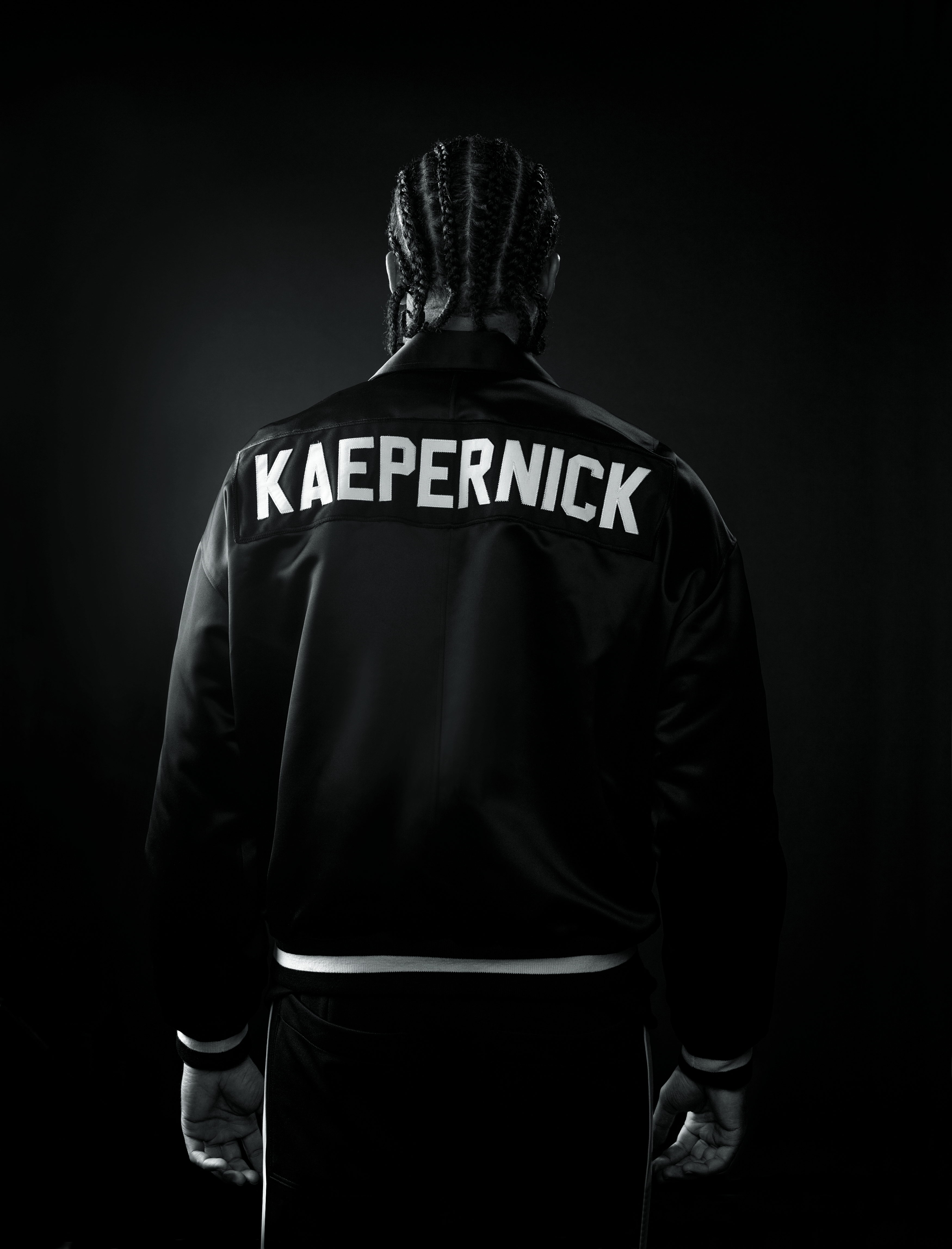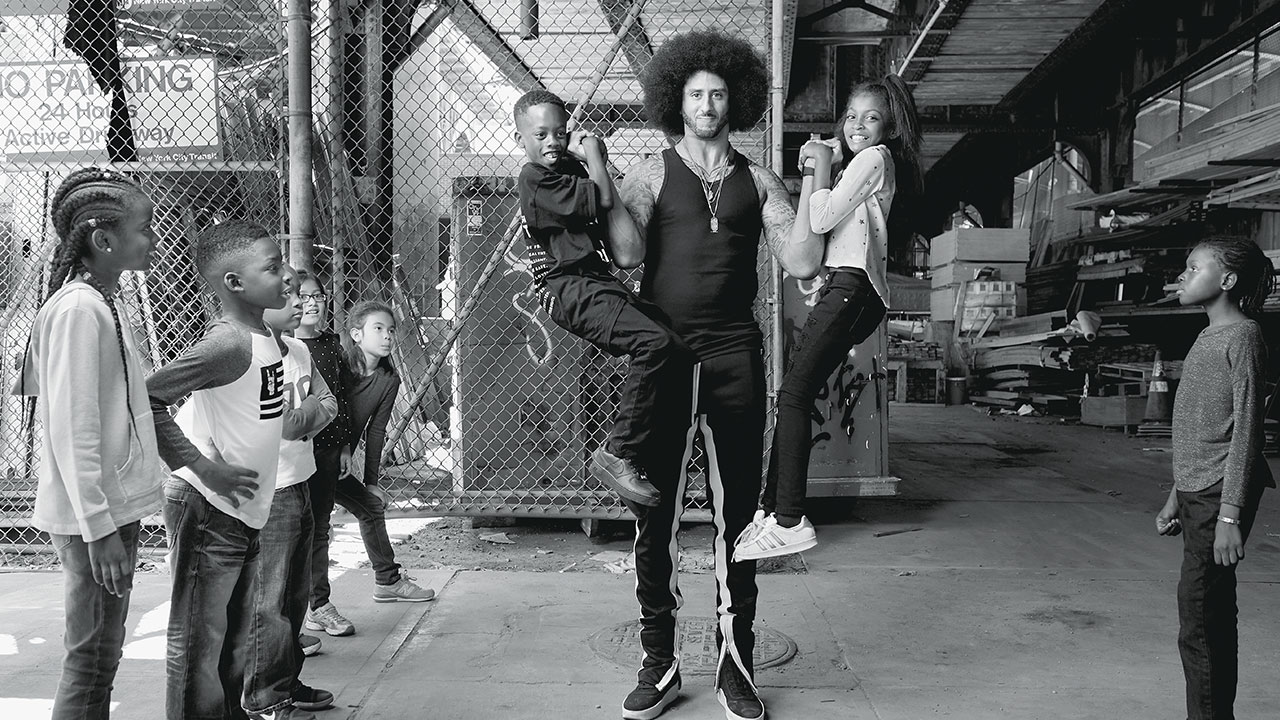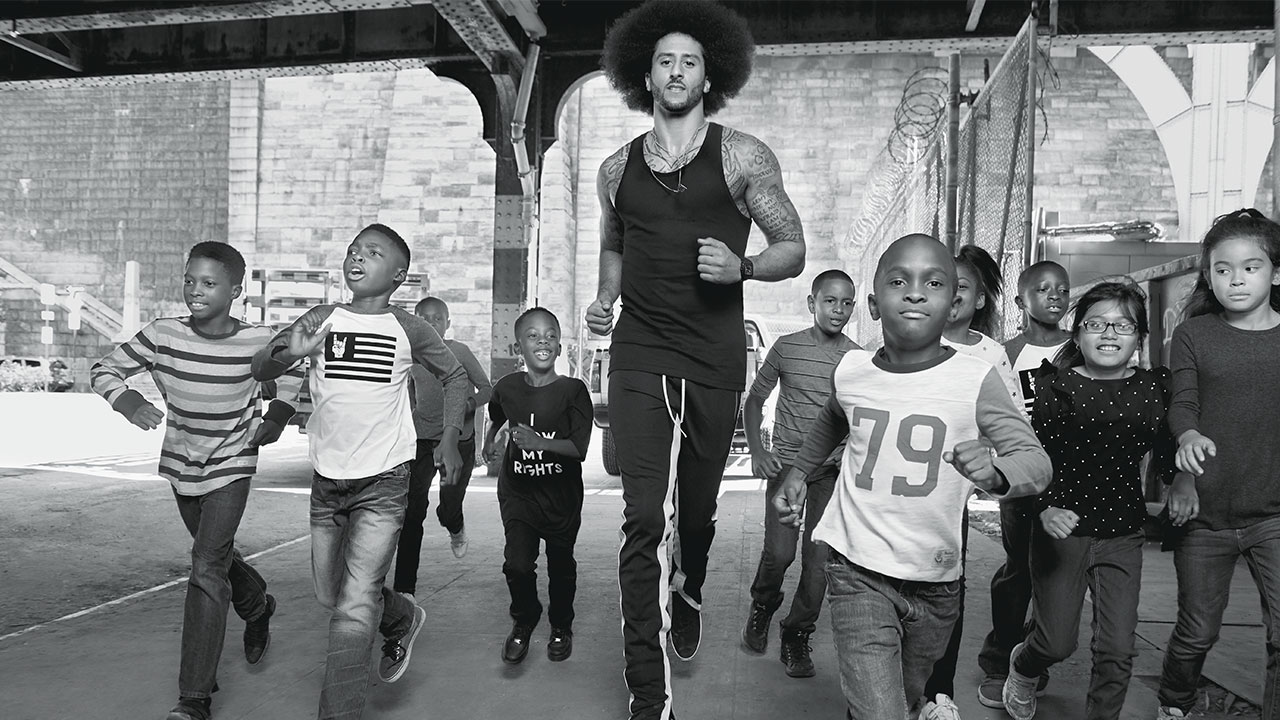Everything
Words: Riccardo Romani
Photography: Martin Schoeller
When ICON spoke with Colin Kaepernick in late 2018, the former NFL quarterback was disgraced for taking the knee during the national anthem in response to ongoing police brutality in America. He has since dedicated his career to championing civil black rights and put his reputation on the line to do so. As riots spread throughout the country and the world following the death of George Floyd who was killed at the hands of white police officers, we revisit the conversation as it becomes more relevant than ever.
Charlotte, North Carolina. 4pm, September 20, 2016. In the parking lot of an apartment complex near the University of North Carolina, police officer Brentley Vinson has been called to arrest a suspected fugitive. At the same time in the same place, Keith Lamont Scott, a 43-year- old African-American married man and father of seven, gets out of his truck. The officer spots him and orders him to drop the weapon they believe he is holding. Scott gets back into his truck but the police keep at him. At this point Scott gets out of his truck for a second time as the plain-clothed officers approach him.
READ: EVERYTHING WE KNOW ABOUT THE MAN GEORGE FLOYD WAS
It’s still unclear as to whether Scott was ever really armed (his family dispute he was reading a book, while police maintain he had a weapon and a rolled marijuana cigarette). Regardless, Scott was fatally shot. A catastrophic act against a man who had nothing to do with their original warrant. Vinson has never been charged, the investigation concluding that he acted according to procedure. Scott was just one of the 258 African-Americans killed by law enforcement in the United States in 2016 alone (according to a study conducted by The Guardian). To put this in perspective, a study by The Washington Post also found that African-American males accounted for 34 percent of the total amount of unarmed people killed by police in 2016. Quite the statistic when you consider that African-American males make up only six percent of the population. So to speak, Scott was one of many.

As starting quarterback for the San Francisco 49ers, Colin Kaepernick is one of the most famous faces in the NFL. The 49ers, having won five Super Bowls, is currently the fourth most valuable football franchise in America. That’s why when Kaepernick, along with teammate Eric Reid, decided to kneel during the national anthem in front of some 50,000 people at San Francisco’s Levi’s Stadium in early September 2016, its impact was volcanic.
Colin Kaepernick explained his position to NFL Media at the time: “I am not going to stand up to show pride in a flag for a country that oppresses black people and people of colour. This is bigger than football and it would be selfish on my part to look the other way.” The backlash was wild, forcing Kaepernick to defend his position amid death threats and boycotts. Three months after taking a knee for the first time he opted out of his contract, making him a free agent. He has now been unemployed since January 2017.
READ: THE TALES OF RACIAL INJUSTICES + THE PRESUMPTION OF GUILT IN THE DEEP SOUTH
I meet Kaepernick in New York a year after the firestorm of controversy first began. We visit the same gym and with his bush-like head of hair standing on 193 centimetres of muscle, he does nothing to go unnoticed. He spends mornings chatting on his smartphone while lifting weights, or looking out over the Hudson River. He emits a mild energy, quite the opposite of what you would expect from someone at the centre of such constant public debate. His smile is sweet and welcoming.
When we speak Kaepernick is all but silent, seemingly aware that anything he says could be turned against him. But he offers me some words, a small blessing of gratitude, said in a low tone, as if even the sound of his voice could cause harm to anyone who shakes his hand and shows him support. “I have to be patient. I know deep down that I did the right thing. Every life that is wasted is worth more than anything. More than my career, without doubt.”
With a simple, unspoken gesture Colin Kaepernick has divided America. “It is sad to see that nothing has changed,” Kaepernick admits. It is no coincidence that he won the Sports Illustrated Muhammad Ali Legacy Award for sportsman of the year in 2017, the publication rewarding his passionate position. Since the events of September 2016, Kaepernick who was raised in Milwaukee, Wisconsin, has since garnered an army of supporters among his NFL teammates. Outside of football, Jay-Z has written pro-Kaepernick lyrics, American military veterans have published an open letter of support to the star and basketball superstar LeBron James has mentioned him in multiple press conferences. However, perhaps most notably has been the support shown by sportswear powerhouse Nike. On September 5th 2018, almost exactly two years since his original kneel, the brand unveiled their 30th anniversary promotional campaign. A cropped black and white photograph showing Kaepernick’s eyes is supported by a quote “Believe in something. Even if it means sacrificing everything.” Much like Kaepernick, Nike then found themselves at the frontline of anti-patriotism backlash. Offended Nike-owners took to social media condemning their support of a player they considered disrespectful to the foundations of America. Vidoeos of Nike apparel being burned made news headlines worldwide. Nike’s response? A touche statement advising of the safest way to burn their products. Once again like Kaepernick, Nike were defiant in their message.

However, with as much high profile support as he has received, condemnation has been just as prevalent. None more so than from the President of the United States, Donald Trump, who, during a campaign rally in Alabama when asked about the players’ kneeling, addressed the crowd with, “When people like yourselves turn on [the] television and you see those people taking the knee when they’re playing our great national anthem. The only thing you could do better is, if you see it, even if it’s just one player, leave the stadium.” He went on “Wouldn’t you love to see one of these NFL owners, when somebody disrespects our flag, to say ‘Get that son of a bitch off the field right now. Out! He’s fired. He’s red!’.” The President making comical reference to his former life as a reality television star on The Apprentice.
In a welcome, and perhaps surprising, turn Bob Kraft, owner of the New England Patriots and long time friend of the president, issued a statement following Trump’s rally and his subsequent tweets of the same nature. As posted to the team’s social social media accounts on September 24, 2017, Kraft said “I am deeply disappointed by the tone of the comments made by the President on Friday. I am proud to be associated with so many players who make such tremendous contributions in positively impacting our communities.” He continued “Our players are intelligent, thoughtful and care deeply about our community and I support their right to peacefully affect social change and raise awareness in a manner that they feel is most impactful.” Such unexpected solidarity from one of the most influential people within the NFL was a boost for the Kaepernick cause, and one that no doubt ushered Nike into certain support longevity.

If nothing else, the scrutiny Kaepernick has received, and the resulting Nike campaign, has created some much needed conversation. Not only in taking a stand, or knee one should say, for the Black Lives Matter movement but for every American that feels helpless watching the numbers of innocent African- Americans killed by police rise.
During our meeting Kaepernick keeps fairly quiet. His voice takes an almost prophetic tone when he speaks “The difficult things are those that set aside the highest reward” he says while he lifts two, 100-kilogram weights. Once the session is over I ask him if he thinks he will return to the game. He stretches his arms and smiles a half smile.
Two teams, Seattle and Baltimore, had shown some interest but have since withdrawn. And, with the average age of a peak pro-footballer being 27 years old, at 30 Kaepernick is unlikely to begin again. However, this is just speculation. On the field, his career has spanned highs and lows but during the last season Kaepernick recorded an impressive nine touchdowns. So the future remains to be seen.
Kaepernick’s partner, Nessa Diab, is a well-known, outspoken radio personality and television host. Together they have created a project called Know Your Rights. A schools-based initiative that sees them speak to students about the value of diversity and the idea of mutual respect. Publicly, Kaepernick’s and Diab’s relationship has created its own controversy among conservatives. Primarily because Diab is a proud Muslim of Egyptian descent, while Kaepernick is a devout Christian.
Criticism and controversy is following Kaepernick in his every move right now, however, perhaps this is what it takes to truly make a difference. As he prepares to lift a 150-kilogram barbell I offer my hand. He shakes it resolutely, then motions a half hug, thanking me for my support. I realise that in order to continue the movement Kaepernick has begun he needs all of us.
THIS ARTICLE APPEARED ORIGINALLY IN THE OCTOBER EDITION OF ICON MAGAZINE.
SUBSCRIBE HERE TO RECEIVE TWO PRINT EDITIONS PER YEAR FOR $15AUD